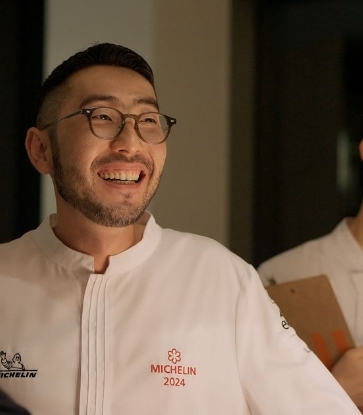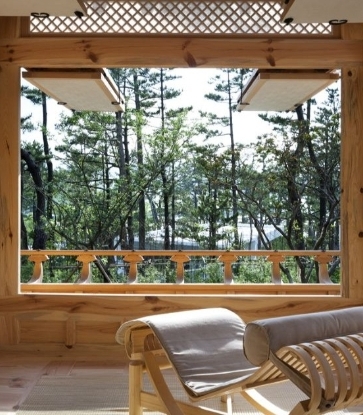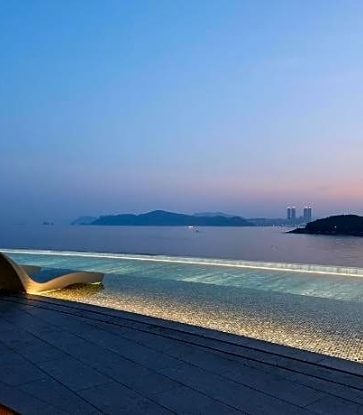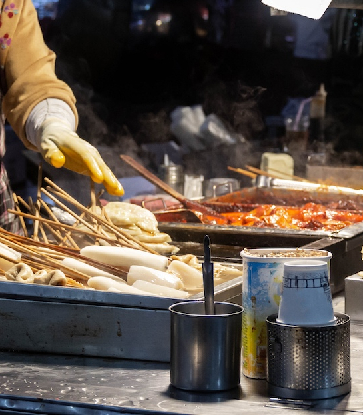MICHELIN Guide Seoul has announced the third recipient of the 2023 MICHELIN Seoul Mentor Chef Award. This award is sponsored by Market Kurly, which works closely with chefs to develop gastronomic culture. The winner of this year's MICHELIN Seoul Mentor Chef Award is Kojima's chef Park Kyung-jae
Kojima, which has maintained its two MICHELIN stars since 2018, was opened by chef Park in 2014 after his stints at Ariake at Josun Hotel and Sushi Chohee at Shilla Hotel. Kojima, which means small island (小島), refers to his hometown. But it feels like the word is describing himself, a steadfast figure who has maintained his position in the middle of the dynamic Cheongdam area without changing. The way he handles seafood with a consistent attitude every day shows his love and pride for sushi.

Park Eun-sae, head of the brand strategy team at Market Kurly, an official partner of the MICHELIN Guide Seoul, said, “Market Kurly, which started from the idea of delivering good food in its best condition, collaborated with the MICHELIN Guide Seoul to expand its gastronomic experiences. In order for an industry to develop, someone needs to take the lead in pioneering the market and taking on new challenges. And today, it is a great honor to announce the 2023 MICHELIN Seoul Mentor Chef Award, which has played a pioneering role in the gastronomy industry. We would like to congratulate and thank the award-winning chef, and Kurly will do our best to contribute to the growth of a sustainable gastronomic culture in the future.”
Congratulations on receiving the 2023 MICHELIN Seoul Mentor Chef Award. How did you feel at that moment?
I remember every single moment. Even on the podium I wondered, ‘Do I deserve this award?’ Although I'm a bit older in the restaurant industry, I didn't expect it at all. (Laughs) After receiving the award, I told myself that I should share more opinions with chefs not only in the sushi industry, but also in the restaurant industry in general. And lastly, I made a personal commitment to be a person who can be a role model.
Who did you contact after receiving the award?
Actually, I wanted to share this joy with the people present more than anybody. These are the people who have been working at the forefront of the industry. I firstly thanked them, and afterward, I prepared a separate gathering to express my gratitude to my staff.

What kind of mentor do you think you are?
It seems like I’m a mentor who always stands with people, not in front of them. I think a mentor should not only teach, but also continue to learn from juniors. Above all, food is something that adapts to the trends of the time. So, regardless of industry, I try to interact with many people. I especially communicate with Korean and Western chefs in Seoul. I’m also thankful to receive a lot of encouragement and advice from Chef Yim Jung-sik of Jungsik, Chef Kang Mingoo of Mingles, and Chef Lee Ji-won of Aupre.
A lot of things have changed in the past two years due to COVID-19. Especially the consciousness of guests, laws, and regulations. I sought advice and help about those parts. In that context, young chefs are rather my guides when it comes to responding flexibly to rapidly changing situations.
In Korea, it is sometimes thought that Japanese restaurant chefs do not interact with the outside world much, but you seem to interact with the outside world a lot.
To some extent, I think it is the atmosphere and culture of Japanese cuisine. Rather than interacting with the outside world, they tend to work while focusing on themselves. Each chef has a very strong personality, and there is still a lot of perception that it is an apprenticeship education. But I think we should actively engage externally. We give and receive help on a work basis, but it always helps to build a personal bond. After all, we are all colleagues striving together in today's industry.

You must have had a mentor too?
Of course. There is CEO Ahn Hyo-joo who helped me to join the Shilla Hotel, and I learned a lot from Ariake's Morita-san as a sushi chef. There is another person, Kimura-san, whom I met when I went to Sushi Kiyoda for training. Through him, I was able to learn what kind of sushi I should aim for. It was rooted in the basics, shows restrained beauty rather than technique, and was calm. I also want to present sushi that has a subtle balance of aged seafood based on simplicity.
I'm sure you've heard this question a lot, but I can't help but ask what your favorite sushi is.
That question is honestly the same as, "Who do you love more...mom or dad?” (Laughs) I like them all. Every fish has its own flavor. However, I do think that white fish has potential. While blue-backed or red-fleshed fish has straightforward, intense flavors, white fish has a subtle taste that reveals itself slowly. I think enjoying the taste of time is the charm of white fish sushi.

How do you describe yourself as a chef?
I see myself as a link between nature and guests. Kojima uses only natural ingredients. So I want guests to feel the original taste as much as possible while being grateful for nature and what it gives to us. Also, I am always cooking with the hope that ingredients from nature will be presented deliciously and beautifully through my hands.
And one more thing, I am a person who thinks that it is important for me to be satisfied with my work. I can only be confident when I am not ashamed of my food. That mindfulness has always stayed with me and has been the foundation for my growth.
As this year's mentor chef, is there anything you would like to say to junior chefs?
It would be too boring to say that you should do your best, right? It's actually an obvious thing to say. I'd rather talk about the environment.
All the materials we use come from nature. However, in the kitchen, we use a lot of disposable items such as detergents, vinyl, and latex gloves that add to environmental pollution. I can't help but use it, but I often say that we should try to minimize these for environmental protection. I think it's a chef's duty to care about nature since we use natural ingredients. I hope that in the future, together with many chefs and junior chefs, we can think about how we can practice environmental protection.
This article is edited by June Lee in English



















